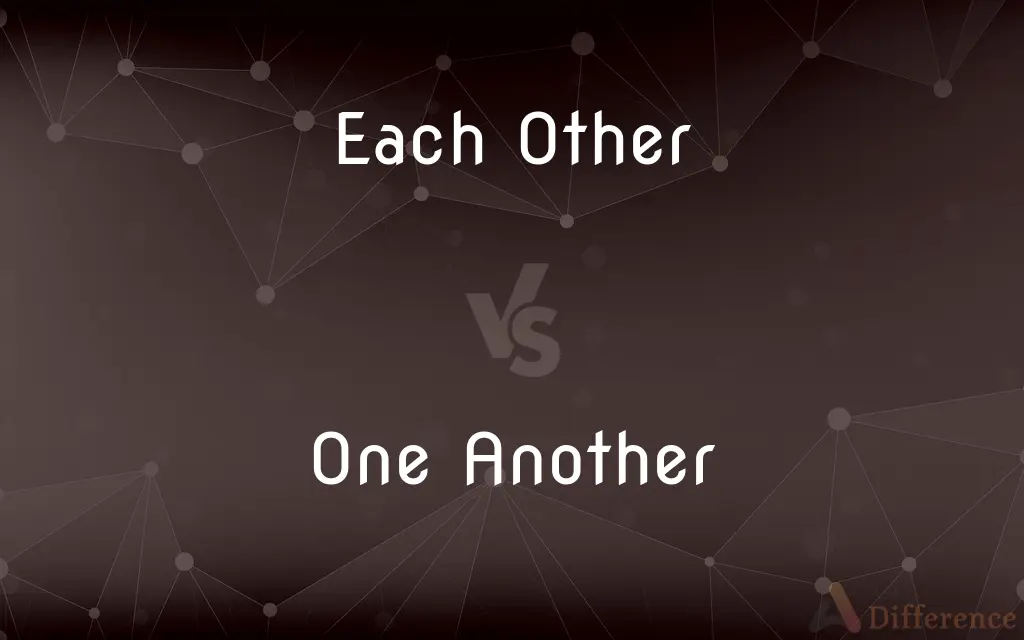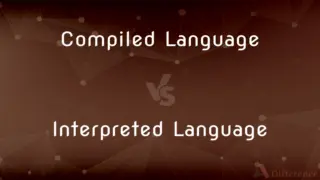Each Other vs. One Another — What's the Difference?
By Tayyaba Rehman — Published on January 9, 2024
Each Other refers to a reciprocal relationship between two entities, while One Another is used for the same but often implies more than two.

Difference Between Each Other and One Another
Table of Contents
ADVERTISEMENT
Key Differences
Each Other is often used when referring to a reciprocal action or feeling between two people. For example, "They looked at each other," implies a two-way action between two individuals. It emphasizes the individuality within a mutual relationship, denoting a one-to-one correspondence.
One Another is used in a similar context as Each Other but is traditionally recommended for interactions involving more than two entities. For example, "The members of the group helped one another," suggests a sense of community and mutual assistance within a group. It can imply a more collective interaction.
Each Other has become widely acceptable for referring to any reciprocal relationship, regardless of the number involved. "The twins hate each other," is just as commonly used as "The classmates respect each other," where the number of people could be two or many.
One Another can still be found in formal writing when the speaker wants to emphasize the action taking place within a group. It carries a sense of inclusivity. For instance, "The players gave gifts to one another," indicates a shared experience among all the players.
In contemporary usage, Each Other and One Another are often used interchangeably, and strict adherence to the old rule of two vs. more than two is not commonly observed. "The neighbors look out for each other/one another," is understood to mean the same thing, with both phrases being acceptable.
ADVERTISEMENT
Comparison Chart
Traditional Usage
Between two parties.
Among three or more parties.
Modern Usage
Can be used for two or more.
Can be used interchangeably with "each other."
Formality
Slightly less formal.
Slightly more formal.
Example Context
Often used with pairs.
Often used with groups.
Implicit Meaning
May emphasize individual actions.
May emphasize collective or community actions.
Compare with Definitions
Each Other
Mutual interaction between two
The dancers moved gracefully around each other.
One Another
Collective interaction in a group
The refugees shared stories with one another.
Each Other
Two individuals affecting one another
They taught each other Spanish and English.
One Another
Group dynamics of assistance
The survivors provided comfort to one another.
Each Other
Bidirectional sentiment or action
The friends hugged each other goodbye.
One Another
Interpersonal relations within a community
The neighbors shared tools with one another.
Each Other
Reciprocal relationship for two
The cats chased each other around the house.
One Another
Shared actions among many
The team members supported one another during the project.
Each Other
Reflecting a two-way action
They sent each other letters regularly.
One Another
Mutual feelings among several individuals
They all knew one another’s struggles.
Common Curiosities
In formal writing, which is preferred?
One Another is slightly more formal, especially when referring to more than two entities.
Can Each Other and One Another be used interchangeably?
Yes, in modern usage, they are often interchangeable.
Can I use Each Other when referring to a large group?
Yes, contemporary usage allows for this.
Is there a difference in the meaning between the two?
Not in meaning, but there may be a subtle difference in the implication of number.
Is Each Other only for two people?
Traditionally, yes, but now it's commonly used for more than two as well.
Does One Another imply more than two people?
Historically, yes, though this distinction is frequently overlooked today.
Are these terms used only for people?
Primarily, but they can also refer to animals or entities capable of reciprocal action.
How do I decide which term to use?
Use Each Other for a clear two-entity relationship, One Another if you want to emphasize the group, or interchangeably if the number is not specific.
Can One Another be used for animals?
Yes, if the animals are engaging in mutual or reciprocal behavior.
Is it incorrect to use Each Other for more than two subjects?
It’s not strictly incorrect, but some grammarians might prefer One Another for more than two.
Can Each Other and One Another be plural?
They are always plural since they refer to mutual actions between multiple subjects.
Can inanimate objects be described with Each Other or One Another?
Only if they are personified or capable of interaction.
Are these terms considered pronouns?
Yes, they are reciprocal pronouns used to indicate a two-way relationship.
Does Each Other always show a positive relationship?
No, it can also describe negative or neutral interactions.
In a sentence, what position do Each Other and One Another typically take?
They often come after the verb to describe a reciprocal action.
Share Your Discovery

Previous Comparison
Compiled Language vs. Interpreted Language
Next Comparison
PowerShell vs. Command PromptAuthor Spotlight
Written by
Tayyaba RehmanTayyaba Rehman is a distinguished writer, currently serving as a primary contributor to askdifference.com. As a researcher in semantics and etymology, Tayyaba's passion for the complexity of languages and their distinctions has found a perfect home on the platform. Tayyaba delves into the intricacies of language, distinguishing between commonly confused words and phrases, thereby providing clarity for readers worldwide.














































